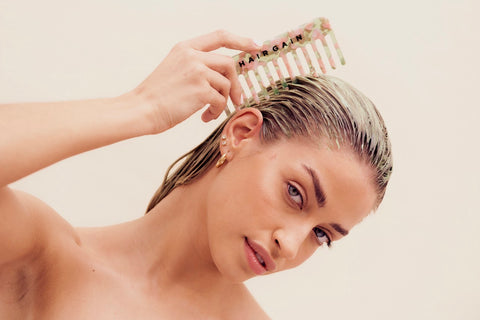Are you always scratching your head because of that maddening itch? Well, you’re in good company. Scalp pruritus, more commonly known as itchy scalp, is a condition that affects many people. It can strike anyone at any time, and is characterised by a sensation of tingling, itching or irritation of the scalp. It can be very uncomfortable, and it can also be embarrassing. The causes of scalp pruritus are numerous and can vary in severity. Whatever the cause, if the condition persists and is left untreated, it has been linked to hair loss. Read on as we explore the causes of the problem and provide tips on how to soothe an itchy scalp.
Dryness
Dry skin is one of the most common causes of an itchy scalp. When your skin lacks moisture, flakiness and itchiness result. This is as true of your scalp as any other part of your body. Changes in weather (especially the cold), harsh hair products and washing hair too frequently can all cause a dry scalp.
Dandruff
Yes, those annoying, sometimes embarrassing flakes are another factor. What causes dandruff still hasn’t been definitively proven, and it is thought to be harmless, but it certainly contributes to an itchy scalp.
Allergies
Sensitivities to pollen, foods pets and medications can all lead to irritation and redness on the scalp. Harsh hair products can also trigger contact dermatitis, a form of allergic reaction. Allergies are a common reason why people need to soothe an itchy scalp.
Medical Issues
An itchy scalp can be caused by underlying health issues. These include psoriasis (a chronic autoimmune condition), eczema and various fungal, bacterial and viral scalp infections.
Stress
Stress has many physical manifestations, and this includes causing the dreaded scalp pruritus.
How To Soothe an Itchy Scalp
Whatever’s behind the problem, it needs to be dealt with. Here are some soothing solutions!
Washing
Do not over wash your hair. Washing too frequently can strip your tresses of their natural oils and dry them out. Wash no more than 2-3 times a week. Only use kind shampoos and conditioners free of harsh chemicals and look for hypoallergenic options. This will help prevent allergic reactions. And when you’re washing your locks, gently massage your scalp to help remove dead skin cells and get blood circulating.
If dandruff is an issue, then look for a suitable anti-dandruff shampoo. But again, avoid ones with harsh ingredients – always read the label and do your research!
Hydrate, Hydrate, Hydrate

Hydration is very important in maintaining a healthy scalp. Drinking enough water is of course key for our overall health, regulating temperature, supporting cells and organs and helping to excrete waste. But there is very little evidence to support the claim that drinking more water directly hydrates skin. You should make sure you drink 8 glasses a day, but taking a topical approach to scalp care is vital.
Avoid long, hot showers as it can strip crucial natural oils from the scalp. Use gentle and moisturising shampoos and conditioners. Don’t use any products with alcohol, known for its drying effect, and regularly use brilliant topical hair and scalp products. Hair Gain’s Hair Mask has been scientifically formulated to provide deep and long-lasting scalp nourishment and hydration. Use for just 10 minutes a couple of times a week for great results! Our new Scalp Foam also intensely hydrates and nourishes the scalp. As well as soothing an itchy scalp, these fantastic products also support fuller and thicker hair. Used together, they reduce hair breakage and fall by up to 60% from the first use*.
Comb Your Hair

Regular gentle combing or brushing your hair helps with both scalp and hair health. It distributes sebum produced by the scalp through the hair, this reduces dryness of your strands and the scalp itself. It also removes dead skin cells and stimulates blood flow. Using the right brush or comb is essential – we recommend Hair Gain’s wide-tooth comb. It effortlessly detangles wet or dry hair, not only boosting your scalp but reducing the risk of hair breakage or damage.
Keeping A Lid On Stress
Reducing stress will not only help soothe an itchy scalp but your overall health too. Mediation, yoga and deep breathing exercises will all improve your stress levels, as will keeping fit. We live in a very fast-paced world, and it can be difficult to find the time, but you need to put your health first. You’ll be amazed at what just 10 minutes a day will do too!
Don’t Scratch
Although it’s extremely tempting, especially if the itching is driving you crazy, don’t scratch your scalp. Whatever the problem causing it, the relief will only be temporary and will very likely make the issue worse. You’re also risking an infection. If it’s unbearable, then use gentle patting to help alleviate the itch.
See A Professional
If the issue persists and the above advice doesn’t help to soothe your itchy scalp, then the issue may be more serious. See a trichologist, your GP or consult a dermatologist - all of whom can examine your scalp. If something like a fungal or bacterial infection is behind it, they’ll prescribe a course of treatment to solve the problem. Most people will see great improvements by following the above scalp care advice though!
*Independently tested May 2023, results achieved when tested as a regime with the Hair Gain Scalp Foam
Read More
Seasonal Hair Shedding Explained
Study Finds Hair Gain Scalp Foam Works Wonders
Denise van Outen Reveals Her Gorgeous Hair Secret: Hair Gain's Hair Mask!
